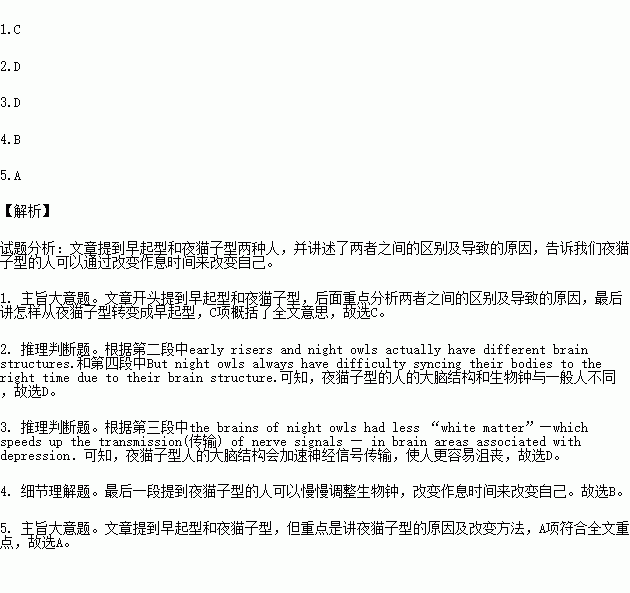题目内容
Are you an early riser or a night owl? Researchers from Aachen University in Germany believe that about 10 percent of people can be classified as “morning people”, who feel more active and function best in the morning.Around 20 percent are night owls—people who naturally tend to stay up late and are more tired during the day.And the rest of us fall somewhere in between, according to New Scientist.
Previous studies have suggested that early risers are more likely to be happy and healthy while night owls experience worse sleep as well as more depression and anxiety during the day.
For a long time, scientists have been trying to find out what causes the differences between the two.A new study suggests that it isn’t just people’s habits—early risers and night owls actually have different brain structures.
Led by Jessica Rosenberg at Aachen University, researchers scanned the brains of 16 early risers, 23 night owls and 20 people with intermediate sleeping hours.They found that the brains of night owls had less “white matter”—which speeds up the transmission(传输) of nerve signals — in brain areas associated with depression.
As you know, after people fly in an airplane from one time zone to another, they often suffer from a confused and tired feeling called “jet lag” because their body clocks are out of sync(不同步的) with the new time zone.It usually takes about a week for their bodies to adjust to the new time.But night owls always have difficulty syncing their bodies to the right time due to their brain structure.“It’s like they suffer from permanent jet lag,” said Rosenberg.
The good news is that it is possible for night owls to turn themselves into morning people.According to the researchers, night owls should try to spend as much time in the sunlight as possible and reduce their exposure to artificial light at night to force their body clocks to shift to a more normal rhythm.
1.What does the article mainly discuss?
A.How to turn early risers into night owls.
B.How our habits influence our sleep patterns.
C.What causes the differences between early risers and night owls.
D.Why early risers are happier and healthier than night owls.
2.We can learn from the article that night owls ________.
A.make up almost a third of the human population
B.have more white matter in their brains than other people
C.are more used to artificial night than sunlight
D.have body clocks that are not in agreement with the actual time
3.Jessica Rosenberg’s research suggests that ________.
A.previous studies about night owls are wrong
B.night owls are affected by jet lag more strongly than others
C.white matter helps our brains work more efficiently
D.brain structure might determine people’s chances of suffering from depression
4.According to the last paragraph, ________.
A.night owls have to give up their unhealthy life habits
B.night owls can learn to adjust their body clocks
C.there is little we can do to ease the trouble of night owls
D.scientists are planning research on how to change night owls’ brain structures
5.What would be the best title?
A.Night Owls Have “Jet leg”
B.Early Riser Have “Jet leg”
C.Who Are Night owls
D.Who Are Early Risers

